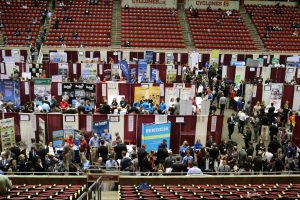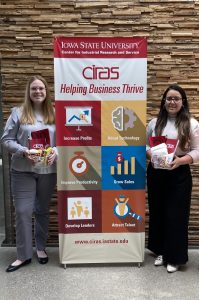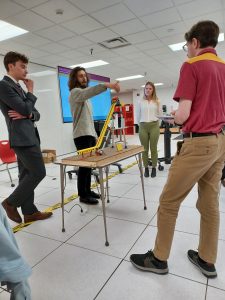Using Career Fairs to Engage Future Workers

Iowa State career fairs are an excellent way for employers to meet, interview, and interact with students to grow an educated and well-rounded workforce.
In-person fairs occur each semester and offer employers the opportunity to fill interview schedules, network with students and increase name recognition.
The College of Engineering career fair attracts thousands of students every year looking for internships, co-ops, and full-time employment.
Companies can register for career fairs through CyHire, an online career management system that allows employers to post positions and manage on-campus recruiting activities. Students use CyHire as their primary source of information about experiential education and full-time employment opportunities.
Engaging with students at all levels of education is an excellent way to increase name recognition and begin building your workforce pipeline. Interacting with first-year students to build relationships can have a significant impact on their future employment decisions.
Building a Workforce Pipeline through Internship Programs

Hosting student internship programs provide employers with the opportunity to create a more educated workforce and build a diverse team that can supply a variety of perspectives to an organization.
Recruiting student interns also provides the opportunity for engagement with the goal of converting the students to full-time employees.
Mayra Ramirez, Workforce Engagement Specialist at CIRAS, said companies can be better at hosting interns by developing an “official internship program.”
“An effective internship program requires the effort of the employer to enhance a student’s academic studies with meaningful professional and personal learning experiences,” Ramirez said. “The development of official intern programming or events to enhance these experiences are highly recommended.”
Employers that are most successful in recruiting students have taken the time to network with students and have built professional relationships over several years.
“Creating a presence on campus early and regularly engaging with students are important strategies for recruiting,” said Ramirez. “Even if companies are not actively hiring, it’s still important to engage students throughout the academic year.”
CIRAS works to provide companies with tailored coaching in partnership with Iowa State University’s Engineering Career Services to enhance current internship programs, recruitment strategy, and student engagement to create better relationships with the future workforce.
Engaging Future Workforce with Capstone Projects
Students enrolled in the College of Engineering are required to complete a capstone course and apply their educational experience to a real-world project provided by companies. The projects are intended to be an effective learning experience as they transition into the workforce.

Capstone projects last 1 or 2 semesters, during which teams of 4 or 5 senior-level students interact with a company sponsor in their final year. During their time with the company, students help to determine project scope, identify and manage project deliverables, work through constraints, and receive feedback on their work.
Participating in the projects provides students with the opportunity to apply a high level of engineering knowledge to a topic of interest such as investigating an engineering problem, redesigning an existing product or process, or exploring a new product concept or technology platform.
Capstones can be used to “seed” innovation projects within the company, applying talent and resources to areas that may otherwise be overlooked.
As companies struggle with a lack of workforce, it’s common to hear phrases such as:
- “I wish I had the time to…”
- “It’s not that difficult, it’s just not a priority”
- “It’s on the back burner”
- “That’s on my engineer’s ‘to-do’ list”
Capstone projects can assist with these issues. Deliverables typically include a final report, data and analyses, design solutions and in some cases, physical concepts.
From a student perspective, participating in a capstone project can offer a truly unique learning experience.
“The work in my capstone project was different from the type of work I had done in coursework and internships, rounding out my experience and better preparing me for the workforce,”
said Taylor Renze, a recent graduate of the engineering program at Iowa State.
CIRAS can assist Iowa companies with capstone projects by identifying what the project might look like, suggesting scope and deliverables, and forming connections across Iowa State.
For more information, contact Mayra Ramirez at ramirezm@iastate.edu or (515) 520-3101